New partnership announced with Borderless
Sona and Borderless announce an exciting partnership.
Building a staff schedule couldn’t be easier.
Reduce payroll errors with real-time T&A.
Fill 50% more shifts with your own employees.
Ensure shifts are covered even if you're understaffed.
Manage absence requests and approvals.
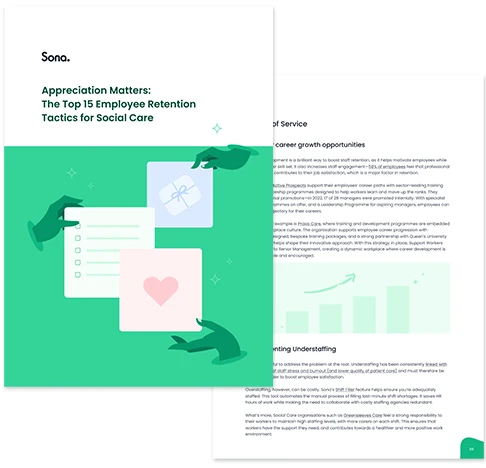
Practical ways to boost team morale with proven examples from across the sector.
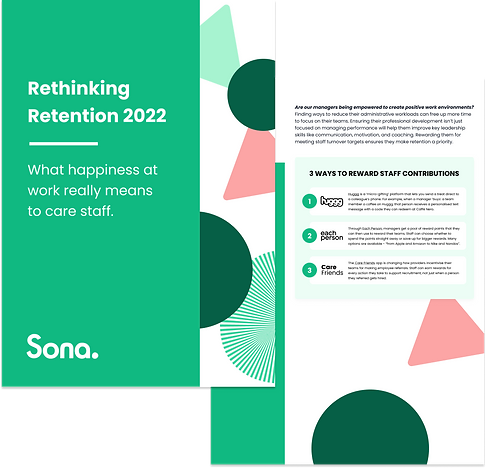
Find out what care employees say matters to them most at work.
Search and view employees with customised permission levels.
Key employment information all in one place.
Store visas, professional certifications and more with easy access.
Control personal and operational details of your staff.

Why are people leaving Social Care, and where are they going?
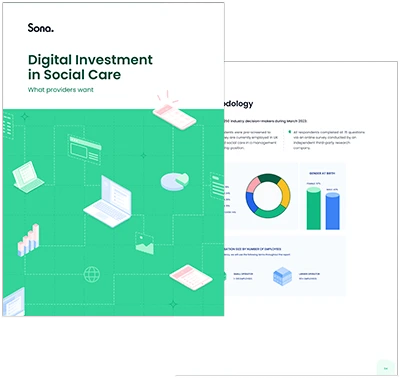
We asked 250 Social Care leaders about their attitudes towards digitisation and their plans for the next 12 months...
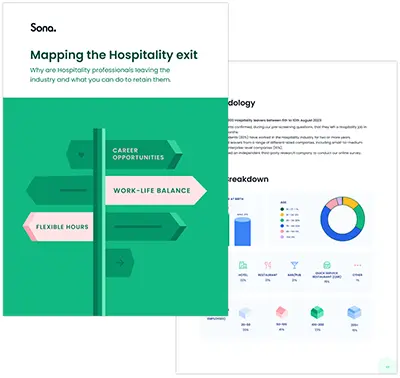
Why are Hospitality workers leaving the industry, and what can you do to retain them?
Share updates with a single click.

Staff can see relevant messages in one place.
Request post-shift feedback from staff.
Recognise staff contributions by sending them praise.
Identify staff at risk of churning.
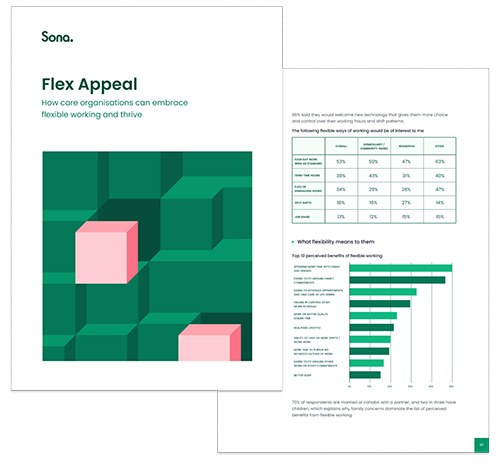
How care organisations can embrace flexible working and thrive.
Maintain quality of care and reduce costs.
Maximise profitability through AI-powered forecasting & scheduling.
Elevate your operational efficiency and guest satisfaction.
Streamline operations across sites.
Developed alongside Social Care experts with decades of combined experience.
See why we are the leading user-friendly, end-to-end platform that prioritises both efficiency and wellbeing.
The Sona Partner Network is an ecosystem of solution experts and complementary technologies.

Give staff greater visibility of shifts available to work, with a simple "shift claim" process to increase their income.
Improve employee engagement and retention with a seamless employee communication platform.
Happier staff provide greater customer experiences, which in turn drives return rates, revenues and recommendations.

Give staff greater visibility of shifts available to work, with a simple "shift claim" process to increase their income.
Improve employee engagement and retention with a seamless employee communication platform.
Happier staff provide greater customer experiences, which in turn drives return rates, revenues and recommendations.

Meet the Sona team online with our webinar series or in-person at an event near you.
New research, insights, and strategies for frontline leaders.
Downloadable templates, reports and guides from Sona.
Stay up to date with the latest Sona news and research.
Learn how our customers are transforming their people operations.
| 3 min read
Sona and Borderless announce an exciting partnership.
| 2 min read
Sona and Found by Lottie announce an exciting partnership.
| 4 min read
Remove operational errors, drive efficiency, and help your team spend less time on admin with a unified solution.
PUBLISHED: February 2025
Download the report to learn how hospitality operators are embracing AI challenges and opportunities in 2025.
PUBLISHED: January 2025
Reveal the most important metrics in 2025!
PUBLISHED: December 2024
This infosheet is packed with practical insights to drive high-quality, low-regret WFM purchases.Social Care, Retention, Report
We surveyed 750 UK-based employees in the care sector to find out how they feel about their current work situations and what matters most to them when making job decisions.
3 minute read

Rethinking Retention explores:
The most important influences on staff satisfaction
Three key areas to focus on this year
Ideas and tools to boost engagement and retention
Download your free copy here.
This first blog in our Rethinking Retention series
The staffing crisis in care may have made more headlines recently, but it’s nothing new. According to CQC estimates, the baseline vacancy rate has remained above 6% for six years. In December 2021, the rate reached 12%.
What has changed is the addition of uncontrollable factors - most notably the pandemic and Brexit - that have made it harder for providers to retain staff.
Understaffed, overstretched, not paid enough.
Former care support worker
In November 2021, the Nuffield Trust reported that 70,000 adult social care workers had left the sector over the previous six months - 4% of the total adult care workforce. Increasing churn in an industry with a long term recruitment challenge is a worrying trend. Unfortunately, our survey results suggest that things are likely to get worse at the start of 2022 before they get better.
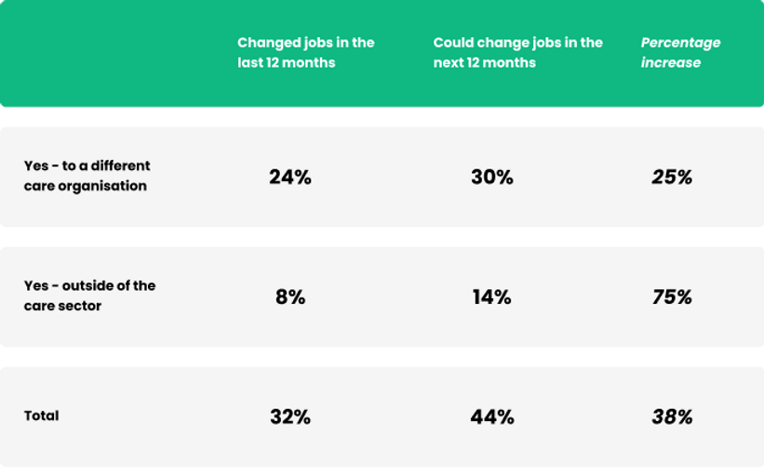
14% of respondents said they are thinking about leaving the sector altogether. Hopefully, this level of intent will not convert into action, but it’s a clear indicator that staffing levels are not yet close to stabilising.
With the overall labour market currently squeezed, care providers will be looking to ease the burden on their recruitment teams by doing everything in their power to retain their existing staff.
Skills for Care notes that, while the overall sector turnover rate is high (28.5% in 2020/21), turnover at the best performing employers doesn’t exceed 10%, For an operator with 2000 staff, going from average turnover to industry-leading would mean retaining 370 more staff each year - a potential saving of over £1m.
The good news? Our research shows that the most important contributors to happiness at work are all things employers can control:
|
Would the following factors have a positive impact on how you feel about working for your current employer? |
Agree |
|
More recognition from management |
92% |
|
Better internal communication |
91% |
|
Having more freedom to choose your working patterns |
90% |
|
Better mental health support for employees |
90% |
|
Greater visibility of my upcoming schedule/hours/holiday |
90% |
Forward-thinking operators are rapidly adopting technology and new working policies and practices so their staff feel more valued and supported.
Learn more at https://www.getsona.com/rethinking-retention
If you liked this article, why not subscribe to our newsletter to get the latest news and views delivered straight to your inbox?
6 min read
The care industry's crisis needs to be solved. One of the solutions – maybe the most important – is improving staff retention. Learn why it’s important and how to do it.
2 min read
Sona was invited to join an expert panel to discuss why care providers should be focused on employee engagement and wellbeing in 2022. Read more here.
3 min read
Struggling with staff retention? Learn how regular well-being and mental health check-ins can transform your worker's lives.